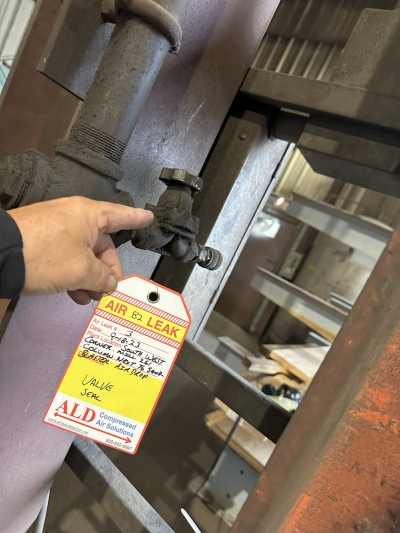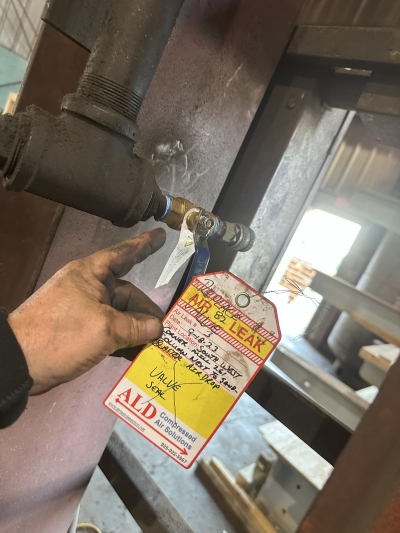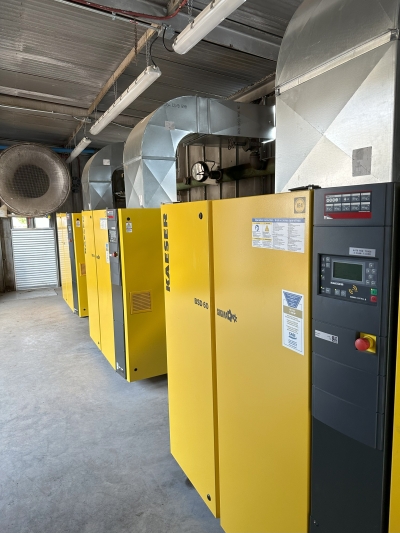Is compressed air leak detection worth the effort? The question is regularly debated, and the answer is: it depends. There is no definitive answer, but compressed air leak detection should be carefully considered when evaluating a facility’s maintenance plan. When discussing compressed air leaks, energy managers should follow this maintenance focused question checklist.
Compressed Air Leak Checklist
- Has a comprehensive leak survey ever been conducted?
- Are we controlling system pressure to ensure artificial demand doesn’t creep back in after leaks have been repaired?
- For single air compressor systems, does our compressor have adequate controls to translate lower flow rates to actual energy saved (VSD, variable displacement, etc.)?
- For multiple air compressor systems, do we have a robust automation platform to translate lower flow rates to fewer air compressors online?
- Does our utility company offer rebates or incentives to help offset the costs of this effort?
- Once leaks have been identified, do we have an actionable plan and resources to repair the leaks?
If these questions are honestly addressed, and the answers point to actual savings that can be realized, then many times it does pay to have a leak detection and repair program. Consider it a demand side preventative maintenance (PM) plan to keep compressed air system efficiency in check, just like many facilities have PM plans for air compressors and ancillary equipment to keep them operating at peak efficiencies.
A new compressed air system was able to translate lower demand into energy savings.
Success Story: Machine Shop in Hampton, Virginia
Recently, a facility followed these steps to evaluate their compressed air system, which led to great results for their operation. The facility is a large machine shop in Hampton, VA that provides service to the Department of Defense (DoD) and uses compressed air to run presses, lathes, sandblasting, paint booths among other processes. The facility had not been concerned with energy efficiency until a new maintenance manager prioritized reducing energy consumption.
The new manager discovered that the facility’s 200 HP modulating air compressor was only fully utilized during brief periods of peak demand when sandblasting and painting operations were underway. The bulk of the time the compressor wasted energy when running highly modulated while underutilized. Identifying the problem, the maintenance manager reached out to his local Kaeser Compressor sales engineer to design a stronger compressed air system. With the help of the local Kaeser sales engineer, the maintenance manager installed an efficient system consisting of three BSD-60 air compressors that were staged to come online as needed by the Kaeser Sigma Air Manager 4.0 controller.
Improving the Process Side of the Compressed Air System
These changes marked a fresh, energy-efficient reset of the compressed air system at this facility, but the process side of the compressed air system had been neglected longer than the air compressors themselves. The hissing of compressed air leaks had become the norm in this facility. The leaks came from old valves that could only be rebuilt using parts from valves scavenged from other parts of the facility, along with air hoses with so many holes that they would be better suited as irrigation lines.
To further improve the facility, the facilities manager took advantage of Dominion Energy’s energy efficiency incentives offered through their Compressed Air program. Designed to help customers reduce energy, Dominion Energy’s Compressed Air program offers a wide range of incentives that help offset the costs for facilities making energy efficient improvements to the demand side of compressed air systems. Leak detection and repair are eligible program measures and the facilities manager hired ALD to implement leak detection and repair measures.
ALD focuses on optimizing the efficiency of compressed air systems and specifically on demand side opportunities. Since the firm is not an air compressor distributor, it can work alongside compressor companies to offer value-add services to increase compressed air system efficiency for end users, which ends up being a win-win situation for all parties.
ALD‘s Demand Side Specialist team can rapidly address compressed air leaks through a “find & repair” method. With a knowledge of demand side operations and a box full of common consumables, specialists can fix most leaks without the need for a plant-wide shutdown.
The team identified 60 compressed air leaks at the Hampton, VA facility, wasting approximately 193 CFM. By the end of the weeklong project, the Demand Side Specialists repaired 42 leaks, saving 143 CFM and an estimated \$17,307 in annual energy costs, as calculated by ALD.
With the help of the incentive from Dominion Energy and Honeywell, the payback on this project was less than four months and did not require the customer to expend any internal resources, leaving the maintenance team free to focus on keeping production running. After the “find & repair” effort, the facility operates only one of the air compressors, rather than the two compressors that were normally operated to satisfy demand. This allows for redundancy in their system and saves on maintenance costs.


“Before and After” pictures of a compressed air leak at the plant.
Fundamentals are fundamental for a reason. When fundamentals like leak detection are neglected, best practices begin to slip. Inefficiency does not happen instantaneously, but slowly becomes the new norm as leaks or open blows are overlooked. Maintaining peak compressed air system efficiency is essential to streamlined operations. Better yet: it doesn’t need to be complicated. A clear, concise, and actionable plan will prevent negligence and keep your operation up-to-date on energy efficiency and cost savings.
For more information contact ALD, Inc. at airleakdetection.net.
About ALD, Inc.
ALD, Inc. is the largest independent compressed air and vacuum auditing and professional services company on the West Coast. We specialize in industrial concierge services including, but not limited to, compressed air system assessments and design and have the capability to manage turnkey project implementations with guaranteed energy savings. ALD is also a major supplier for robust industrial automation platforms, ultrasonic leak detection equipment/services and many other energy efficient demand side compressed air parts and equipment. ALD administers the Industrial Compressed Air System Efficiency (ICASE) Program in northern and central California and is also a certified third party implementor for many utility companies across the U.S.
To read articles on Compressed Air Leak System Assessments, visit www.airbestpractices.com/system-assessments/leaks.
For expert presentations, visit our Webinar Archive Section dedicated to Compressed Air Measurement at www.airbestpractices.com/webinars.
Jan/Feb 2024.





